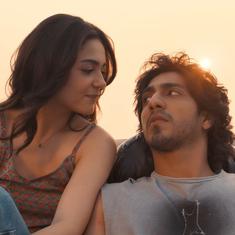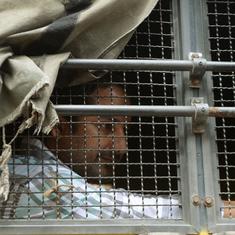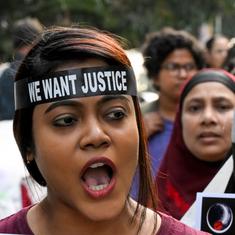Roger Federer has credited his wife Mirka with keeping him motivated and still going strong at 36, although his longevity has “many pieces to the puzzle”.
The Swiss master won his 20th Grand Slam title at the Australian Open on Sunday when he defeated Marin Cilic 6-2, 6-7(5), 6-3, 3-6, 6-1.
The latest triumph – his sixth at Melbourne Park – came 15 years after he won his first major at Wimbledon in 2003, yet he continues to defy time when many of his contemporaries have fallen by the wayside.
He said having a supportive partner was key to him still being able to do what he loves, with wife Mirka courtside for most of his big games, despite now having four children to look after.
This, coupled with a careful schedule, has allowed him to remain at the top, with no thoughts of calling it quits any time soon.
🎶 Oh what a night 🎶
— #AusOpen (@AustralianOpen) January 28, 2018
20 Grand Slam titles and still going strong. @rogerfederer absorbs the enormity of this emotional milestone 🎥#AusOpen #RF20 pic.twitter.com/dV2AZPYmz2
Full Transcript
Q. What were you thinking at the beginning of the final set?
ROGER FEDERER: Just really trying to get back winning a game again because he came back from 3-2 maybe and won four straight. So for me it was really just trying to break his momentum. Tried to serve well. Tried to get lucky a little bit. I think I was able to get that first game, at least get on the board. From then on, maybe momentum shifts a little bit, and it’s exactly what happened.
I think experience helped me there a little bit, and also a little bit of luck, I felt like I needed a little bit tonight.
Q. Does number 20 have any particular significance to you?
ROGER FEDERER: The number?
Q. Yes.
ROGER FEDERER: Not the number, per se, no. I don’t have a special memory with the number 20. Maybe if I have time to think about it, because thus far I was not allowed to think of it going into the match, because that’s exactly when things go bad, when you think too far ahead. I think that was a tricky one tonight.
All day I was thinking, How would I feel if I won it, how would I feel if I lost it? I’m so close, yet so far. I think I was going through the whole match like this.
I’ve had these moments in the past, but maybe never as extreme as tonight. Getting to 20 is obviously very, very special, no doubt.
Q. Maybe it’s a little early in the press conference, but could I persuade you, as the men’s champion, to put a few words on the women’s champion? You know Caroline for a while. How do you see her as a person and her achievement here?
ROGER FEDERER: Yeah, I mean, look, it was a kind of match people were hoping for. When you get it, your first one for Halep or Wozniacki, it doesn’t come the easy way, a 6-2, 6-2 match. You have to fight for it. You think you have it, you lose it, in the end you still get it.
I was very happy for her, but also at the same time very sad for Simona. They both had brutal tournaments. Winning the first one clearly is incredibly special. I’m sure she’s over the moon right now, which she should be.
Got to celebrate like it’s your last one. I don’t mean that in a negative way, but you don’t know if you’re ever going to feel the same emotions ever again. Stars aligned for her this tournament. Yeah, I was very happy for her.

Q. What were your thoughts on the decision to play this final in indoor conditions?
ROGER FEDERER: I wasn’t sure if it was good for me or not, to play under the roof or not. Of course, I backed myself in sort of indoor conditions. This is where my first success ever came. I do think back that usually when I play indoors, it’s good for me.
But I didn’t mind the heat, to be honest. I thought maybe for a bigger guy like Marin, maybe it’s also going to slow him down faster throughout the match. At the end, it’s not my decision. They kept me posted along the way.
I was surprised to hear they had the heat rule in place for a night match. I never heard that before. When I arrived to the courts, I was totally ready to play outdoors. They told me they were thinking – they think it will probably be indoor. Then they kept me posted along the way.
Half an hour before, we got the word that it’s going to be indoors. For me, it doesn’t change anything in the preparation, to be honest. I was ready for either.
Q. It’s your sixth Australian Open title. Tell us how it feels to equal Emerson and Djokovic.
ROGER FEDERER: I mean, ‘equaling’? I don’t know how to explain you, it doesn’t matter. It’s about living the emotions that I went through tonight again at the trophy ceremony, going through a tough rollercoaster match, five-setter against Cilic, who is a great player, and then getting No. 6 here, No. 20 overall. It’s just a very special moment.
Defending my title from last year, sort of the fairytale continues. That’s what stands out for me, maybe not equaling Emerson or Novak. They had their own unbelievable careers. I admire what they’re doing and have done with Emo. Yeah, it’s definitely a very special moment in my life again.
Q. Is it time to give a new nickname to this special trophy?
ROGER FEDERER: I don’t know. It was always with me last year, as it is the first time I had the original-sized Australian Open trophy, the Norman Brookes trophy. Instead of calling it the trophy, I felt like I could give it a name. As it is called Norman, I felt it was very fitting. Rather than saying, I’m bringing the trophy, it’s, I’m bringing Norman along. It’s like a friend now. We got to know each other.
It was just funny last year. I don’t know if I’ll do it again this year. Sure, Norman has a special place for us, anyway. It’s great to be sitting here tonight with him right now, this morning.
She was there for the 1st and she's there for the 20th..15 years have gone by. What a journey! #KingAndQueen pic.twitter.com/oETblpMvqD
— MB (@mbthecool19) January 28, 2018
Q. How do you keep your ambitions for Grand Slam titles? Your age is 36. This is 20 Grand Slam titles. How can you keep your ambition?
ROGER FEDERER: I think by not overplaying, not playing every tournament possible. I enjoy practice. Not minding the travel. Having a great team around me, they make it possible. At the end it’s seeing that my parents are incredibly proud and happy that I’m still doing it. They enjoy coming to tournaments. That makes me happy and play better.
Then, of course, my wife who makes it all possible. Without her support, I wouldn’t be playing tennis no more since many years. But we had a very open conversation, if she was happy to do this or not, years ago. I’m happy that she’s super supportive, and she’s willing to take on a massive workload with the kiddies. Same for me, because I wouldn’t want to be away from my kids for more than two weeks. This life wouldn’t work if she said no.
Many puzzles need to fit together for me to be able to sit here tonight.
Q. Why were you so emotional after the game? Can you describe the moment when you had that incredible crowd reaction? Even Rod Laver was scrambling.
ROGER FEDERER: I didn’t see that through my thick tears, that he was taking a picture of me crying. I don’t know what to tell you. I was trying to explain it to the news channels. I think what happened is I got to the finals very quickly. The semis was cut short. I had a lot of emotions left in me because I didn’t have to go to extreme like last year against Nishikori, Stan, so forth.
I think when it was all said and done, it reminded me very much of the Baghdatis final, which was tough. I was the favorite. I got to the finals in a really good manner. Then when it was all said and done, Rocket gave me the trophy, I was standing in front of the people, I don’t know, it’s when it really hits me.
When I start thinking about what I was going to say, every subject I touch actually is very meaningful and very emotional. Thanking your team, congratulating Marin, thanking the people, thanking the tournament. At the end it’s like one big party.
But I hoped over time in the speech I would start to relax a little bit, but I couldn’t. It was what it was. I wish it wasn’t so sometimes. At the same time I’m happy I can show emotions and share it with the people. If I got emotional, it’s because it was a full crowd again. No people in the stadium wouldn’t make me emotional, I’ll tell you that. This is for them really also.
"I've won three Slam now in 12 months. I can't believe it myself" - Federer
— Christopher Clarey (@christophclarey) January 28, 2018
Q. There’s that great corridor that comes off of Laver Arena with all the photos of the champions. You had a reflective moment by yourself when you were walking down that corridor. Share what your thoughts were, what was going on in your mind.
ROGER FEDERER: It wasn’t as deep as you make it sound. It was very light (smiling).
I was just trying to make sure I have enough power in my biceps, which is not very big, trying to carry this guy. It was special walking past Stefan Edberg’s banner, the shield with his two wins. He’s very inspirational, very important man in my career as a role model. Growing up he was important for me.
I don’t know. I was just really happy, to be honest, that it was all done. I was so bloody nervous all day. It was eating me up inside. That’s why, when it was all over, I was just so relieved, to be quite honest. I think it was more of a relief walk at that point.
Q. Why do you think you were so nervous going into this match? From the outside looking in, you’d think last year would probably be more nerve-wracking.
ROGER FEDERER: You can’t explain it sometimes. It is just a feeling you get. It’s like against Berdych, I felt, like, I’m probably going to lose this one. I was not negative, but I just felt like I saw a loss was coming somehow. Not because I was not feel good or anything, I just felt like maybe Berdych is really feeling it.
Today for the finals, I didn’t fall asleep very well after the Chung match. I think it surprised me that at this stage of a competition in semis, to get a walkover, that was very odd for me. I couldn’t fall asleep until about 3 in the morning. All of the next day I was already thinking about how should I play Marin, how cool would it be to win 20, but no, don’t think of it, but how horrible would it be to lose it. I had it for over 36 hours, to be honest. It was a lot.
Like I explained, I felt like the finals came very quickly because of not dropping any sets and stuff, still having so many emotions left. I needed to probably work through these emotions this way. That’s what made me nervous.
But it’s all good. I had a good start to the match. I think I lost the second because of nerves, to be honest. It’s all good. I like to care. It’s good I can care about these matches.
Q. Is that the first time you’ve felt that way?
ROGER FEDERER: No, I’ve had it many times. When it’s all said and done, I’ll be happy that I don’t have to go through these moments anymore.
I don’t know, it’s nice in hindsight, but in the moment itself... Especially with a night finals, you wait all day. At Wimbledon, you get it out there and get it done. Here you’re like (tapping fingers). It’s a long day. It’s a long day.
Night turns to morning and the champion arrives for his press conference. Said he was super nervous, thinks he got really emotional because of the contrast between today’s tough match and the rest of the tournament. pic.twitter.com/z6WPzz3r8Z
— Eleanor Crooks (@EleanorcrooksPA) January 28, 2018
Q. What did you think about the last challenge? Were you annoyed?
ROGER FEDERER: The thing is, I thought that was it. Then I don’t know what happened. The people started clapping. I was, like, Am I wrong to think the match is over? Have I celebrated too early? I almost had to check the score.
I don’t know what happened next. Then it seemed like he challenged.
So you challenged? I was, like, Oh, no. Was it out, really? It felt good all the way.
But, of course, he has to challenge it. Imagine you lose a match because of that one because you’re too polite not to challenge at the end.
But I had a good feeling, and it was 40-Love. It wasn’t like last year where we had the back-and-forth saving breakpoints. This was 5-1, 40-Love, so I was more relaxed.
I couldn’t believe it. I found out actually he did challenge. It was like a second celebration. It came in two waves. I don’t take those things personally. He has to do it.
Q. You’re 36, going against guys who are bigger, stronger, younger. How long do you think you can continue playing at this level?
ROGER FEDERER: No idea. Honest, I don’t know. I have no idea. I’ve won three slams now in 12 months. I can’t believe it myself. I just got to keep a good schedule, stay hungry, then maybe good things can happen. Then I don’t think age is an issue, per se. It’s just a number.
But I need to be very careful in my planning, really decide beforehand what are my goals, what are my priorities. I think that’s what’s going to dictate how successful I will be.
Exciting times ahead. But, no, as a professional, it’s what we do. But I’m happy I’m in that position right now.
With inputs from AFP.










